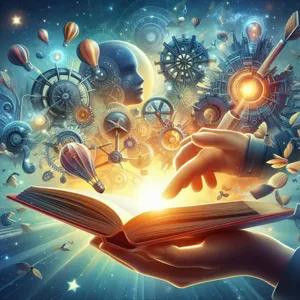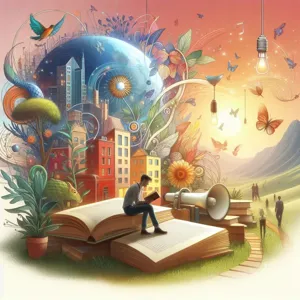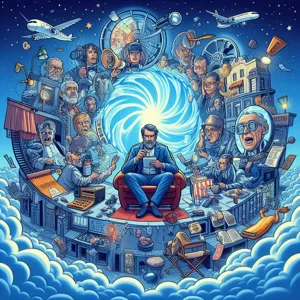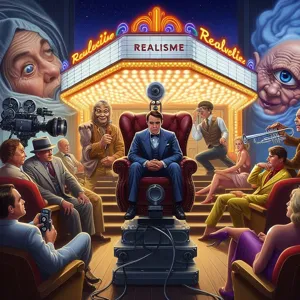In a world overflowing with stories, finding a book that resonates with your values and experiences can feel like searching for a needle in a haystack.
Yet, the right book has the power to transport you to new worlds, provide comfort in shared experiences, and challenge your perspectives. Whether you’re seeking a tale that mirrors your journey, one that inspires growth, or a narrative that reaffirms your beliefs, this guide is here to help you navigate the vast literary landscape. We’ll delve into essential strategies for discovering books that reflect your unique identity and values, from exploring diverse authors and genres to utilizing community recommendations and online resources. Join us on this journey to uncover your next favorite read—a book that not only entertains but also speaks to your soul and enriches your understanding of the world around you.
1. Understanding Your Reading Preferences

Understanding your reading preferences is the crucial first step in your journey to discovering books that resonate deeply with your values and experiences. Just as each of us has unique tastes in food, music, or art, our reading choices are equally personal. Start by reflecting on the genres that have captured your interest in the past. Are you drawn to the heart-pounding thrill of a mystery novel, the thought-provoking depth of literary fiction, or perhaps the imaginative landscapes of science fiction and fantasy? Jot down your favorite books from each genre, noting what specifically appealed to you—was it the character development, the plot twists, or the emotional resonance?
Next, consider the themes that matter most in your life. Do you find yourself gravitating towards stories of resilience, social justice, love, or self-discovery? Identifying these key themes can help narrow your search, ensuring that the stories you choose reflect your own values and experiences. For example, if you’re passionate about environmentalism, seeking out books that tackle ecological issues or feature strong environmentalist characters might resonate with you.
Additionally, think about the type of characters you relate to. Do you prefer characters facing moral dilemmas, those on a quest for identity, or perhaps individuals overcoming adversity? Understanding the traits and arcs that draw you in can guide you toward books that not only entertain but also mirror your personal journey.
Finally, don’t hesitate to explore beyond your comfort zone. While it’s essential to recognize your preferences, sometimes the most profound insights come from unexpected places. Reading diverse perspectives can not only broaden your understanding of the world but also enrich your own narrative. By taking the time to understand your reading preferences, you set the stage for a fulfilling literary adventure—one that promises not only enjoyment but also personal growth and connection.
2. Identifying Your Core Values
Identifying your core values is a vital first step in the journey of discovering books that resonate deeply with your personal beliefs and experiences. Core values are the fundamental beliefs that guide your decisions, shape your character, and influence how you interact with the world around you. They may include principles such as honesty, compassion, adventure, justice, or creativity, among many others.
To begin this exploration, take a moment to reflect on the moments in your life when you felt most fulfilled or proud. What were you doing? Who were you with? These reflections can be telling indicators of what you truly value. Consider keeping a journal where you jot down thoughts on experiences that stirred strong emotions—whether they be joy, anger, or inspiration. This practice can help clarify what principles matter most to you.
Once you have a clearer picture of your core values, you can start seeking out literature that mirrors these principles. For instance, if social justice is a value you hold dear, delve into works that tackle themes of inequality and advocacy. If adventure and exploration excite you, look for stories that whisk you away to distant lands or present daring journeys.
Beyond personal introspection, engaging with communities that share your values can also be enlightening. Book clubs, online forums, or social media groups often have recommendations tailored to specific interests or principles. Sharing your values with others can lead to discovering hidden gems that you might not encounter on your own.
Ultimately, identifying your core values not only enriches your reading experience but also allows you to connect with narratives that reflect your own journey, fostering a deeper engagement with the stories you choose to immerse yourself in. As you embark on this literary quest, remember that the right book can illuminate your path, inspire growth, and resonate with the very essence of who you are.
3. The Importance of Relatable Characters

In the vast universe of literature, relatable characters serve as the bridge between readers and the stories they inhabit. These characters breathe life into the pages, drawing readers into their world with familiar struggles, dreams, and emotions. When a character grapples with challenges that mirror our own experiences—be it the trials of navigating relationships, the pursuit of personal ambition, or the search for belonging—it creates a profound connection that enhances our reading experience.
Relatable characters allow us to see ourselves within the narrative, fostering empathy and understanding. They echo our triumphs and failures, reminding us that we are not alone in our journeys. For instance, a character who faces the daunting task of overcoming self-doubt can resonate deeply with anyone who has navigated their own insecurities. Their victories feel like our victories, and their heartbreaks, our heartbreaks. This level of connection not only enriches the reading experience but encourages introspection, prompting us to reflect on our values and experiences.
Moreover, authors who craft relatable characters often do so by infusing them with authenticity. These characters are not perfect; they are multifaceted individuals with dreams, fears, and flaws. Their complexity makes them more human, allowing readers to engage with their stories on a deeper level. When we see characters who embrace their vulnerabilities and navigate their imperfections, it empowers us to confront our own.
As you embark on your quest to find your next favorite book, seek out those stories that promise characters whose journeys resonate with your own. Look for narratives that reflect your values, struggles, and aspirations, as these are the stories that will leave a lasting impact. Whether it’s through a gripping tale of personal growth or a heartwarming story of friendship, relatable characters can transform a simple reading experience into a meaningful exploration of who you are and who you aspire to be.
4. Exploring Genres that Resonate with You
When it comes to discovering your next favorite book, exploring genres that resonate with you is an essential step that can deepen your reading experience. Each genre carries its unique voice, themes, and emotional undertones, allowing you to connect with characters and narratives that reflect your values and experiences.
Start by taking a moment to reflect on what truly moves you. Do you find solace in the fantastical worlds of science fiction and fantasy, where imagination knows no bounds? Perhaps you are drawn to the raw honesty of memoirs, where real-life stories illuminate the struggles and triumphs of others. Maybe you find inspiration in the pages of self-help books that guide you toward personal growth and fulfillment. By identifying the genres that speak to your heart, you can streamline your search for books that not only entertain but also resonate with your unique perspectives.
For those who enjoy weaving through complex moral dilemmas, literary fiction might be your haven, offering rich storytelling that challenges societal norms and provokes thought. If you’re someone who thrives on fast-paced action and adventure, thrillers or mysteries could provide the adrenaline rush you crave, while allowing you to escape into gripping plots.
Don’t shy away from exploring sub-genres or hybrids either! The beauty of today’s literary landscape is the amalgamation of styles—think magical realism or historical fiction with a twist—that can surprise and delight you. You could stumble upon a contemporary romance that powerfully addresses social issues or a fantasy epic that draws parallels to your own life experiences.
As you navigate through different genres, make a note of what resonates with you—a particular tone, character archetype, or thematic exploration. Engaging in discussions with friends, joining book clubs, or browsing online platforms like Goodreads can also provide valuable recommendations tailored to your interests. Ultimately, the key is to remain open to new experiences, allowing each genre to reveal its treasures and insight, enriching your understanding of yourself and the world around you. In this journey of exploration, you may just find that next favorite book that feels like a reflection of your own story.
5. Utilizing Book Recommendation Tools and Websites

In an age where information is at our fingertips, utilizing book recommendation tools and websites can be a game changer in your literary journey. These platforms are designed to cater to your unique tastes, preferences, and values, helping you discover stories that resonate deeply with your personal experiences.
Imagine standing in a vast library, filled with countless shelves of books, each one a potential gateway to a new world. Now, picture having a knowledgeable librarian by your side, guiding you to hidden gems that align with your values. This is essentially what book recommendation tools do. Websites like Goodreads, LibraryThing, and even specialized apps like Bookly allow you to create personalized profiles where you can rate books you’ve read, list your favorites, and input genres that interest you. The algorithms behind these platforms then analyze your reading habits to suggest titles that you’re likely to enjoy.
Moreover, many of these tools provide curated lists based on themes, such as diversity, environmental issues, mental health, and more. This feature is particularly beneficial for readers seeking stories that reflect their beliefs or provide insights into different perspectives. You can filter recommendations by genre, mood, or even by the specific values you hold dear, ensuring that the books you choose not only entertain but also enrich your understanding of the world.
Don’t underestimate the power of community in this process. Many book recommendation websites foster vibrant communities where users share their thoughts, reviews, and lists. Engaging with fellow readers can open up discussions that lead you to works you might not have considered before. In these spaces, you can ask for recommendations that align with specific values or experiences, and you may stumble upon a heartfelt memoir, a thought-provoking novel, or a compelling nonfiction book that profoundly resonates with your own life journey.
In summary, leveraging book recommendation tools and websites is an effective way to cut through the noise of an overwhelming selection and find your next favorite read. With just a few clicks, you can embark on a literary quest that aligns perfectly with your values, experiences, and the stories you’re eager to explore. So go ahead, dive into the digital world of book recommendations, and let the adventure of discovery begin!
6. Seeking Out Diverse Voices and Perspectives
In a world rich with stories, seeking out diverse voices and perspectives can profoundly enhance your reading experience, allowing you to uncover narratives that resonate with your values and experiences. When you intentionally choose books from authors of different backgrounds, cultures, and life experiences, you open the door to a tapestry of viewpoints that challenge your thinking and deepen your understanding of the world around you.
Imagine curling up with a novel that transports you to a bustling market in Marrakech, vividly detailing the sights, sounds, and scents through the eyes of a local merchant. Or envision diving into a memoir that chronicles the resilience of a refugee navigating a new life in a foreign land, sharing insights that mirror struggles and triumphs we all face, regardless of our backgrounds. These stories not only broaden your horizons but also foster empathy and connection with others.
To find these enriching narratives, consider exploring independent bookstores or online platforms that specialize in promoting underrepresented authors. Join book clubs or discussion groups that focus on diverse literature, as these communities often highlight lesser-known gems that you may not stumble upon otherwise. Utilize social media platforms, where readers frequently share recommendations and reviews, allowing you to discover books that resonate with your quest for authenticity and representation.
Furthermore, don’t shy away from genres or formats you might not typically explore. Poetry, graphic novels, or anthologies can offer unique perspectives that provide a fresh lens through which to view familiar themes. By diversifying your reading list, you not only enrich your own literary journey but also support authors whose voices might otherwise remain unheard.
Incorporating diverse perspectives into your reading repertoire is not just about seeking new stories; it’s about fostering a deeper understanding of the human experience. Each book you pick up holds the potential to reflect your values, challenge your assumptions, and expand your worldview, ultimately leading you to your next favorite read.
7. How to Use Social Media for Book Discoveries

In today’s digital age, social media has become a treasure trove for book lovers looking to discover their next favorite read. Platforms like Instagram, Twitter, TikTok, and Goodreads are buzzing with vibrant communities of readers, authors, and book enthusiasts, all eager to share their thoughts and recommendations. Here are some effective ways to leverage social media for your book discoveries:
**Join Book Communities and Clubs**: Many platforms host dedicated groups where readers connect over shared interests. Join Facebook groups or subreddits focused on your favorite genres or themes that resonate with your values. Engaging in discussions will expose you to new titles and perspectives that you might not encounter otherwise.
**Follow Book influencers and Bloggers**: Bookstagrammers on Instagram and booktubers on YouTube curate beautiful and engaging content that showcases both popular and hidden gems. By following these influencers, you can gain insights into upcoming releases, author interviews, and personal reviews. Their enthusiastic recommendations can spark your interest in books that align with your experiences and beliefs.
**Utilize Hashtags**: On platforms like Twitter and Instagram, hashtags are your best friend when searching for book recommendations. Use tags like #BookRecommendations, #Bookstagram, or #ReadWithMe to find posts that can guide you to your next read. You can also create your own hashtag to share your reading journey and gather suggestions from your followers.
**Engage with Authors**: Many authors actively engage with their readers on social media. Follow your favorite authors to stay updated on their latest works, virtual events, and discussions. Often, they share insights into the themes and values that inspired their writing, allowing you to connect on a more personal level with the stories they create.
**Participate in Reading Challenges**: Social media platforms often host reading challenges that encourage readers to explore different genres, themes, or authors. Joining these challenges not only broadens your reading scope but also connects you with fellow participants who share similar interests. You can exchange recommendations and insights, making your reading journey more enriching and interactive.
**Create a Reading List**: Use platforms like Goodreads to keep track of your reading goals, list books you want to read, and follow friends for recommendations. You can also share your reviews and thoughts on books you’ve read, adding to the community’s pool of knowledge and experience.
By harnessing the power of social media, you can turn book discovery into an engaging and reflective experience. With every scroll, tweet, and post, there’s a world of stories waiting for you—stories that resonate with your values and experiences, ready to become your next favorite read. Happy exploring!
8. Joining Book Clubs and Online Communities
Joining book clubs and online communities can be a transformative way to enhance your reading journey, offering a wealth of perspectives and recommendations that align with your values and experiences. These spaces create a vibrant tapestry of readers who share your passion for literature and are eager to explore the nuances of storytelling together.
In a traditional book club, you’ll gather with fellow bibliophiles—whether in cozy living rooms or local cafés—to delve into a selected book’s themes, characters, and plot twists. The collective discussion can reveal insights you might have overlooked, exposing you to different interpretations that resonate with your own experiences. The camaraderie formed during these meetings fosters a sense of belonging and connection, particularly when the selected books reflect shared values or highlight diverse voices.
On the other hand, online communities expand this experience even further. Platforms like Goodreads, Reddit, and Facebook groups allow you to engage with an even broader audience, where you can seek recommendations tailored to your interests—be it social justice, mental health narratives, or explorations of cultural identity. These forums are often brimming with enthusiastic members eager to share their latest reads, creating a rich source of inspiration.
Moreover, participating in virtual book discussions, author Q&As, and themed reading challenges can deepen your engagement with literature. These interactions not only help you discover your next favorite book but also connect you with authors and fellow readers who share your values. Whether you’re seeking a space to discuss the intricacies of a beloved classic or looking to explore new genres that reflect your journey, joining book clubs and online communities is a powerful step toward cultivating a more enriching reading life. Embrace this opportunity to connect, learn, and grow—after all, the right book can change your perspective, ignite your passions, and resonate with the very core of who you are.
9. Reading Book Reviews and Summaries
Reading book reviews and summaries can be an invaluable tool in your quest to find stories that resonate with your values and experiences. In today’s digital age, a plethora of platforms offers insights into countless titles, making it easier than ever to sift through the vast literary landscape.
When you dive into reviews, you’re not just getting a glimpse of what a book is about; you’re also accessing the perspectives of others who may share similar values, interests, or life experiences. Reviews often highlight themes, character development, and plot nuances that can help you gauge whether a book aligns with your personal narrative. For example, if you’re passionate about social justice, seeking out reviews from readers who emphasize a book’s exploration of systemic issues can be particularly enlightening.
Summaries play an equally important role in this process. They provide a concise overview of a book’s premise, characters, and major plot points, allowing you to determine if the story’s direction intrigues you before committing to the full read. This is especially useful for those with busy schedules or for readers who might feel overwhelmed by the sheer volume of options available.
When exploring reviews and summaries, consider visiting reputable literary websites, community forums, or even social media platforms where avid readers share their insights. Don’t shy away from seeking out diverse voices and opinions; a varied array of perspectives can reveal dimensions of a book that resonate more deeply with your own values and experiences.
By incorporating book reviews and summaries into your reading journey, you not only enhance your ability to discover meaningful stories but also cultivate a richer understanding of how literature can reflect and shape the world around you. Happy reading!
10. Exploring Themes that Reflect Your Experiences
Diving into the world of literature can be a transformative journey, especially when you seek stories that resonate with your own life experiences and values. Exploring themes that reflect your experiences allows you to connect with characters and narratives on a deeper level, making the reading experience not just enjoyable, but profoundly personal.
Consider the themes that have shaped your own journey—identity, resilience, love, loss, or the quest for purpose. These universal themes often serve as the backbone of compelling stories. For instance, if you’ve faced challenges in your life, books that delve into overcoming adversity can provide not just solace but also inspiration. Titles like “The Alchemist” by Paulo Coelho weave the theme of personal legend and self-discovery, encouraging readers to pursue their dreams against all odds.
Moreover, you might find comfort in narratives that explore cultural heritage or family dynamics, offering a mirror to your own background. Books such as “The Joy Luck Club” by Amy Tan beautifully illustrate the complexities of mother-daughter relationships and the immigrant experience, providing both reflection and understanding.
To uncover these thematic treasures, engage with book recommendation platforms, literary blogs, or community book clubs that share your interests. Don’t hesitate to explore genres outside your usual preferences—sometimes, the most unexpected reads can illuminate aspects of your life you hadn’t considered before.
By seeking out stories that align with your values and experiences, you not only enhance your reading list but also foster a deeper connection to the world around you. Let the themes echo your own life, guiding you toward narratives that inspire, challenge, and enrich your understanding of yourself and others.
11. The Role of Awards and Bestsellers in Your Selection
When it comes to selecting your next favorite book, awards and bestseller lists can serve as invaluable guides, illuminating paths to stories that resonate with your values and experiences. These accolades often highlight works that have garnered not just critical acclaim, but also the attention of readers worldwide, making them popular choices for those seeking relatable narratives.
Best-selling books frequently capture the zeitgeist of a particular moment, reflecting themes, struggles, and aspirations that resonate with a broad audience. They often touch on universal experiences—love, loss, identity, and resilience—allowing you to connect deeply with the characters and their journeys. On the other hand, award-winning books tend to emphasize literary quality and innovation, offering fresh perspectives and profound insights into the human condition. These stories often challenge conventions, provoke thought, and invite you to see the world through a different lens.
While it’s essential to recognize the merit of these recognitions, remember that they are not the sole indicators of a book’s potential to resonate with you personally. Dive deeper into the reasons behind their accolades—read reviews, explore author interviews, and consider the themes that resonate with your own life experiences. A book may be a bestseller or an award-winner, but what truly matters is how its story aligns with your values and emotional landscape.
In this vast literary world, let awards and bestsellers guide you, but don’t shy away from exploring lesser-known titles or debut authors who may offer unique narratives that speak directly to your heart. Your next favorite book could be waiting in the wings, ready to enrich your life in unexpected ways.
12. Creating a Personal Reading List
Creating a personal reading list can be one of the most rewarding steps in your literary journey. It acts like a compass, guiding you toward stories that resonate deeply with your values and experiences. Start by reflecting on your interests—consider the themes, genres, and authors that have moved you in the past. Are you drawn to narratives that explore social justice, self-discovery, or perhaps the complexities of human relationships? Make a note of these preferences, as they will serve as the foundation for your list.
Next, dive into recommendations from trusted sources. Friends, family, and online communities can provide a wealth of insight into books that align with your values. Platforms like Goodreads or Bookstagram can also be treasure troves of inspiration; explore curated lists, read reviews, and engage with fellow book lovers. Don’t shy away from branching out—sometimes, the most profound connections come from unexpected genres or authors outside your usual circle.
Keep your list dynamic and fluid. As you read, revisit and revise your selections based on new discoveries or shifting interests. This is your personal literary journey, and it should evolve alongside you. Consider setting goals, such as reading a certain number of books each month, or tackling a specific theme for a season. This approach not only keeps your reading experience fresh and exciting but also allows you to delve deeper into topics that matter to you.
Finally, make it a habit to reflect on each book after you finish it. Jot down your thoughts, feelings, and lessons learned. This practice will not only enrich your reading experience but also help you understand how each story reflects your values and experiences, reinforcing your connection to the narratives that truly matter to you. By crafting a personal reading list, you are not just choosing books; you are curating a collection of stories that will inspire, challenge, and resonate with the essence of who you are.
13. Tips for Sampling Books Before Committing
Choosing a book can be a deeply personal experience, and committing to a new read can sometimes feel daunting, especially when you’re unsure if it will resonate with your values or experiences. Thankfully, there are several effective strategies for sampling books before making that commitment, allowing you to find your next favorite without the risk of disappointment.
**1. Read the First Chapter:** Many authors and publishers offer the first chapter of a book for free, either on their websites or through platforms like Amazon and Goodreads. This sneak peek can provide insight into the writing style, tone, and pacing, helping you determine if the book aligns with your preferences.
**2. Explore Online Excerpts:** Websites like Google Books and Project Gutenberg allow you to read selected pages or excerpts from various titles. This can help you gauge the author’s voice and the narrative style, ensuring it’s something you can connect with.
**3. Use Audiobook Samples:** If you’re considering an audiobook, take advantage of the sample feature on sites like Audible. Listening to the initial chapters can give you a sense of the narrator’s style, the book’s rhythm, and whether the content resonates with you.
**4. Join Book Discussion Platforms:** Engage with online communities like Goodreads or Bookstagram, where members often share reviews and insights. Many users provide summaries and thoughts on themes, which can help you decide if a book reflects your values and experiences.
**5. Check Out BookTube:** YouTube has a vibrant community of book reviewers and enthusiasts who share their thoughts on various reads. Watching a few video reviews can give you a broader perspective on the book’s content, themes, and writing style.
**6. Visit Your Local Library:** Libraries are treasure troves of literary gems. Not only can you browse and sample books physically, but many also offer programs where you can attend readings or discussions, providing additional context and insights into the themes and messages of the books.
**7. Ask for Recommendations:** Don’t hesitate to reach out to friends, family, or even bookstore employees for recommendations. Sharing your interests and values can lead to personalized suggestions that you might not discover on your own.
By employing these strategies, you can sample a variety of books without the pressure of a full commitment, ensuring that your next read will not only entertain but also resonate deeply with you. Happy reading!
14. Keeping an Open Mind: Embracing New Genres
When it comes to finding your next favorite book, keeping an open mind is essential—especially when it comes to exploring new genres. It’s all too easy to get comfortable in the familiar, sticking to the genres you know and love, but stepping outside your literary comfort zone can lead to unexpected delights. Imagine diving into a gripping science fiction novel after years of only reading historical fiction, or losing yourself in a poignant memoir when you typically prefer thrillers. Each genre offers its own unique lens through which to view the world, and embracing this diversity can enrich your reading experience in profound ways.
Consider each genre as a different world waiting to be explored. Fantasy can whisk you away to realms of magic and adventure, while romance can delve deep into the complexities of human relationships. Non-fiction might provide insights into real-life issues that resonate with your values, while poetry can evoke emotions that prose sometimes cannot capture. By venturing into these new territories, you may discover themes and narratives that resonate deeply with your own experiences, enriching your understanding of yourself and others.
Moreover, you might stumble upon authors who challenge your perspectives or stories that reflect your values in ways you never anticipated. A well-written book in a genre you’ve never tried could become a mirror reflecting your own beliefs, fears, and aspirations. Embrace the serendipity of picking up a book simply because it piques your curiosity, even if it’s outside your usual preference. Allow yourself the freedom to be surprised and inspired; you might just find a new favorite author or a compelling story that lingers in your mind long after you’ve turned the last page. Keeping an open mind not only broadens your literary horizons but also helps you connect with the diverse tapestry of human experience, making your reading journey all the more rewarding.
15. Reflecting on Your Reading Journey and Growth
As you dive deeper into the world of literature, taking a moment to reflect on your reading journey can be both enlightening and rewarding. Each book you’ve read is not just a story; it’s a chapter of your own life, shaping your perspectives, beliefs, and understanding of the world. Consider how your reading choices have evolved over time. What themes or genres once captivated you that no longer resonate? Have your interests shifted as your life experiences have changed?
Reflecting on your reading journey allows you to recognize patterns in your preferences and values. Perhaps you started with fiction that offered escapism, then transitioned to non-fiction that challenged your views or inspired personal growth. This evolution is a natural part of your literary exploration and can lead to discovering new authors or genres that align more closely with your current self.
Additionally, keep a reading journal where you note your thoughts, favorite quotes, and the emotions each book evoked. This practice not only enhances your comprehension but also serves as a valuable resource for self-discovery. It allows you to see how particular stories have mirrored your own experiences or provided insight into challenges you’ve faced.
Engaging in discussions with fellow readers can further enrich this reflection. Book clubs or online forums can be wonderful platforms to share insights, broaden your perspective, and discover how others interpret the same narratives.
In the end, reflecting on your reading journey isn’t just about the number of books consumed; it’s about understanding how these stories have shaped who you are and who you aspire to become. Embrace the growth that comes with each page turned, and let it guide you to your next favorite read—one that resonates with your values and reflects your unique experiences.
In conclusion, discovering your next favorite book is not just about finding a good story; it’s about forging a deeper connection with narratives that resonate with your values and experiences. By exploring diverse genres, seeking recommendations, and reflecting on your personal journey, you can uncover stories that inspire, challenge, and enrich your life. Remember to embrace the adventure of reading as a personal journey—one that not only entertains but also helps you grow and understand the world around you. So grab a cup of tea, cozy up in your favorite reading nook, and embark on your next literary adventure. Your next great read is waiting to be found!




